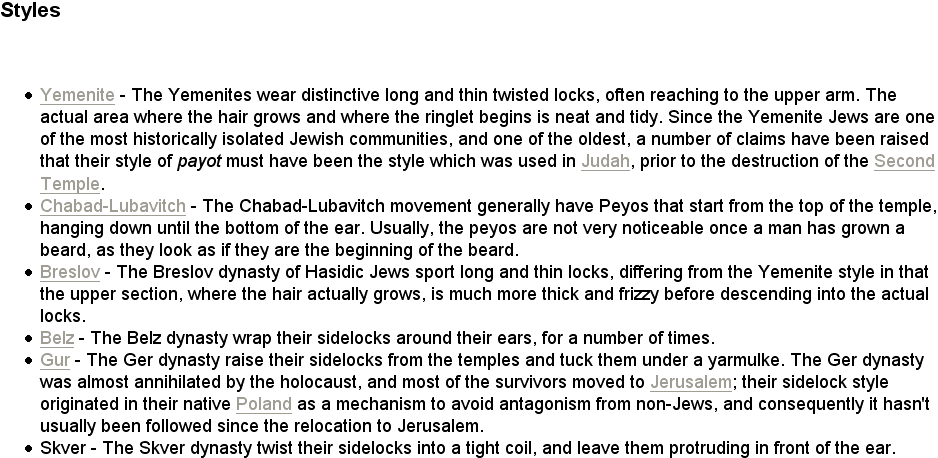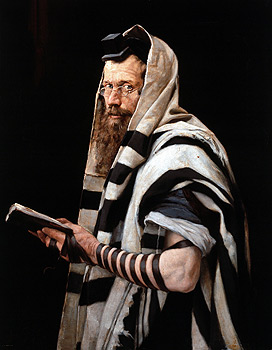“You shall be holy, for I, the Lord, your G-d, am holy”
Every man shall fear his mother and his father, and you shall observe My Sabbaths. I am the Lord, your G-d. You shall not turn to the worthless idols, nor shall you make molten deities for yourselves. I am the Lord, your G-d. When you slaughter a peace offering to the Lord, you shall slaughter it for your acceptance. It may be eaten on the day you slaughter it and on the morrow, but anything left over until the third day, shall be burned in fire. And if it would be eaten on the third day, it is abominable; it shall not be accepted. And whoever eats it shall bear his sin, because he has profaned what is holy to the Lord, and that person shall be cut off from his people. When you reap the harvest of your land, you shall not fully reap the corner of your field, nor shall you gather the gleanings of your harvest. And you shall not glean your vineyard, nor shall you collect the [fallen] individual grapes of your vineyard; you shall leave them for the poor and the stranger. I am the Lord, your G-d. You shall not steal. You shall not deny falsely. You shall not lie, one man to his fellow. You shall not swear falsely by My Name, thereby profaning the Name of your G-d. I am the Lord. You shall not oppress your fellow. You shall not rob. The hired worker's wage shall not remain with you overnight until morning. You shall not curse a deaf person. You shall not place a stumbling block before a blind person, and you shall fear your G-d. I am the Lord. You shall commit no injustice in judgment; you shall not favor a poor person or respect a great man; you shall judge your fellow with righteousness. You shall not go around as a gossipmonger amidst your people. You shall not stand by [the shedding of] your fellow's blood. I am the Lord. You shall not hate your brother in your heart. You shall surely rebuke your fellow, but you shall not bear a sin on his account. You shall neither take revenge from nor bear a grudge against the members of your people; you shall love your neighbor as yourself. I am the Lord. You shall observe My statutes: You shall not crossbreed your livestock with different species. You shall not sow your field with a mixture of seeds, and a garment which has a mixture of shaatnez shall not come upon you. If a man lies carnally with a woman, and she is a handmaid designated for a man, and she had not been [fully] redeemed nor had her document of emancipation been granted her, there shall be an investigation; they shall not be put to death, because she had not been [completely] freed. He shall bring his guilt offering to the Lord, to the entrance of the Tent of Meeting, a guilt offering ram. And the kohen shall effect atonement for him with the guilt offering ram, before the Lord, for the sin that he had committed; and he shall be forgiven for the sin that he had committed. When you come to the Land and you plant any food tree, you shall surely block its fruit [from use]; it shall be blocked from you [from use] for three years, not to be eaten. And in the fourth year, all its fruit shall be holy, a praise to the Lord. And in the fifth year, you may eat its fruit; [do this, in order] to increase its produce for you. I am the Lord, your G-d. You shall not eat over the blood. You shall not act on the basis of omens or lucky hours. You shall not round off the corner of your head, and you shall not destroy the edge of your beard. You shall not make cuts in your flesh for a person [who died]. You shall not etch a tattoo on yourselves. I am the Lord. You shall not defile your daughter by making her a harlot, lest the Land fall into harlotry and the land be filled with immorality. You shall observe My Sabbaths and revere My Sanctuary. I am the Lord. You shall not turn to [the sorcery of] Ov or Yid'oni; you shall not seek [these and thereby] defile yourselves through them. I am the Lord, your G-d. You shall rise before a venerable person and you shall respect the elderly, and you shall fear your G-d. I am the Lord. When a stranger sojourns with you in your land, you shall not taunt him. The stranger who sojourns with you shall be as a native from among you, and you shall love him as yourself; for you were strangers in the land of Egypt. I am the Lord, your G-d. You shall not commit a perversion of justice with measures, weights, or liquid measures. You shall have true scales, true weights, a true ephah, and a true hin. I am the Lord, your G-d, Who brought you out of the land of Egypt. You shall observe all My statutes and all My ordinances, and fulfill them. I am the Lord.
- You shall not steal Heb. לֹא תִּגְנֹבוּ. This is an admonition against someone stealing money, while “You shall not steal (לֹא תִגְנֹב) ” in the Ten Commandments is an admonition against stealing people [i.e., kidnapping]. [This is] a matter derived from its context [namely, “You shall not murder,” “ You shall not commit adultery,” each of which is] a capital crime, [which is the case of kidnapping but not of stealing money]. — [see Rashi on Exod. 20:13; Sanh. 86a]
- and a garment which has a mixture Why is this stated? Since Scripture says, “ You shall not wear a mixture of wool and linen together” (Deut. 22:11)
- You shall not eat over the blood [This verse is] expounded in many different ways in Sanhedrin (63a) [as follows]: (a) It is a warning that one must not eat from the flesh of holy sacrifices before the dashing of the blood; (b) It is a warning against [anyone] who eats from an ordinary animal before its soul [contained in its blood] has [fully] departed; and in many more [ways this verse is expounded there].
- You shall not round off the corner of your head This refers to someone who [cuts his hair in such a way that he] makes [the hair on] his temples even with that behind his ear and on his forehead [i.e., the front hairline], thereby causing [the hairline] surrounding his head to become a circle, since the main hairline behind the ears is at a much higher level than [the hair on] his temples. — [Mak. 20b]
- the edge of your beard [meaning:] The end of the beard and its borders. And these are five: two on each cheek at the top [edge of the cheek] near the head, where [the cheek] is broad and has two “corners” [i.e., extremities, one near the temple and the other at the end of the cheek bone towards the center of the face]-and one below, on the chin, at the point where the two cheeks join together. - [Torath Kohanim 19: 74; Mak. 20b]
- You shall rise before a venerable person One might think [that the commandment refers to rising before] an old person, [even though he may be] guilty [of transgression]. Scripture, therefore, says, זָקֵן the term זָקֵן exclusively refers to one who has acquired wisdom [see Num. 11:16, where the same term refers to great, wise men, and therefore not guilty of transgression]. — [Torath Kohanim 19:80; Kid. 32b]
- and you shall respect the elderly What is meant by “respecting” [the elderly]? One may not sit in his place, speak in his stead [when it is the elder’s turn to speak], or contradict him. [Since one is obligated to rise before the elderly only when the latter enters within one’s four cubits,] one might think that he may close his eyes [when the elder approaches], as if he did not see him [and thus evade the obligation to rise before him]! Therefore Scripture adds here, “and you shall fear your G-d,” for this matter is privately known to the one who commits it, and no one knows about it except the person himself, and, concerning any matter known only in the heart [of one person,], Scripture says, “and you shall fear your G-d,” [for G-d knows man’s thoughts]. — [Torath Kohanim 19:80; Kid. 31b, 32b]
- Rashi: The end of the beard and its borders. And these are five: two on each cheek at the top edge of the cheek near the head, where [the cheek] is broad and has two “corners” [i.e., extremities, one near the temple and the other at the end of the cheek bone towards the center of the face]-and one below, on the chin, at the point where the two cheeks join together. - [Torath Kohanim 19: 74; Mak. 20b]
- Orthodox View: There are five edges of the beard, each of which it is forbidden to shave (Rashi). But as a practical matter, since the exact areas of these edges are not clearly defined, it is forbidden to shave the entire beard.
- Karaite View: In these two verses we are forbidden to make four types of "cuttings" AS A SIGN OF MOURNING ONLY. Doing this for other purposes is OK.
- 1) Making a bald spot on the head as an act of mourning
- 2) Shaving the beard as an act of mourning
- 3) Cutting the skin as an act of mourning
- 4) Writing on the skin as an act of mourning
- Encyclopedia of the Jewish Religion: copyright 1986, page 59 “BEARD: Among the ancient Hebrews and other oriental nations, the beard was considered a symbol of manhood and was carefully tended, trimmed (in later periods especially in honor of the Sabbath and festivals), and anointed. Its removal - except as a sign of mourning - was a disgrace (cf. II Sam. 10:4-5), though shaving was obligatory in certain purification ceremonies (cf. Lev. 14:9). The biblical injunction not to "mar the edges of your beard" in the fashion of pagan worshipers was interpreted by the rabbis as a prohibition against shaving in general, . . . The kabbalists, especially the followers of Isaac Luria, ascribed mystic significance to the beard, and would not even trim it.”
- Online Sources: We can translate this verse as follows: “You shall not round the hair located on the temple area of your heads, neither shall you shave off the cheek area of your beard.” By inserting the proper meanings of these words we find that the commandment teaches us not to shave off the cheek area of the beard in the manner of a “goatee.” Again, it is understood that an Israelite man is commanded to grow a beard and specifically, that he should not shave off the area known as the corner. Because it was part of Israelite life for a man to have a beard, Tanakh has only a few direct references to beards. However, those mentioned are significant and set precedence for a man having a beard. Tanakh refers to the following people as having beards: Aaron the High Priest - Psalm 133 King David - Samuel 21:13
- History: Under 'Beard', The International Standard Bible Encyclopedia' states that beards were not cut or trimmed: 'The Hebrews generally wore full rounded beards, as contrasted with the desert nomads who frequently clipped or cut their beards (cf. Jer. 9:26; 25:23; 49:32; etc.). The Egyptians were clean shaven, although high officials wore artificial beards.' 'The Torah forbad trimming the edges of the beard (Lev. 19:27), though Ezekiel was told to shave off his beard as a token of coming destruction (Ezk. 5:1).'17 One of the humiliations of a conqueror was to shave or take off the beards of the men. This Ezekiel displays to the Jewish people as a picture of the coming destruction of Jerusalem, under the direct command from G-d. Unger's Bible Dictionary, under 'Hair' states this about the beard: 'Among the Hebrews the beard was considered an ornament and was not shaven, only trimmed (2 Sam. 19:24).' 'The removal of the beard was a part of the ceremonial treatment proper to a leper (Lev. 14:9).' 'The custom in mourning was and is to shave or pluck out it and the hair (Isa. 15:2; 50:6; Jer. 41:5; 48:37; Ezra 9:3), to neglect it in seasons of permanent affliction (2 Sam 19:24), and to regard any insult to it as the last outrage that enmity can inflict (10:4-5). The beard was an object of salutation (20:9), and it was a custom to swear by it (Matt. 5:36). The law (sic) forbade the deforming of the head by cutting away the hair around it, and of the beard by cutting the corners (Lev. 19:27). This is understood to mean that the hair was not to be cut in a circle from one temple to another, as among the Arabs; neither might that portion of the face where the beard and hair met be shaved. These regulations are thought by some to have reference to the fact that among some nations these customs are part of idolatrous worship.'
- Payot: תואפ, peyot (hebrew), payos, peyes (yiddish), пейсы (russian): translates into English as corners/sides/edges; denoting sidelocks, and sometimes also sideburns. Haredi, Hasidic and Yemenite Jews often wear distinctive long payot. Yemenite Jews refer to their sidelocks as ‘simanim’, meaning signs, because the sidelocks were historically the main feature which differentiated them from Yemenite Muslims. Modern Orthodox & Conservative Jews wear more varyingly sized sideburns.

 More Info:
More Info:
- http://www.absoluteastronomy.com/topics/Conservative_Judaism
- http://www.absoluteastronomy.com/topics/Shaving_in_Judaism
- http://www.absoluteastronomy.com/topics/613_mitzvot
- http://tripatlas.com/Payot
- http://en.wikipedia.org/wiki/Beard









